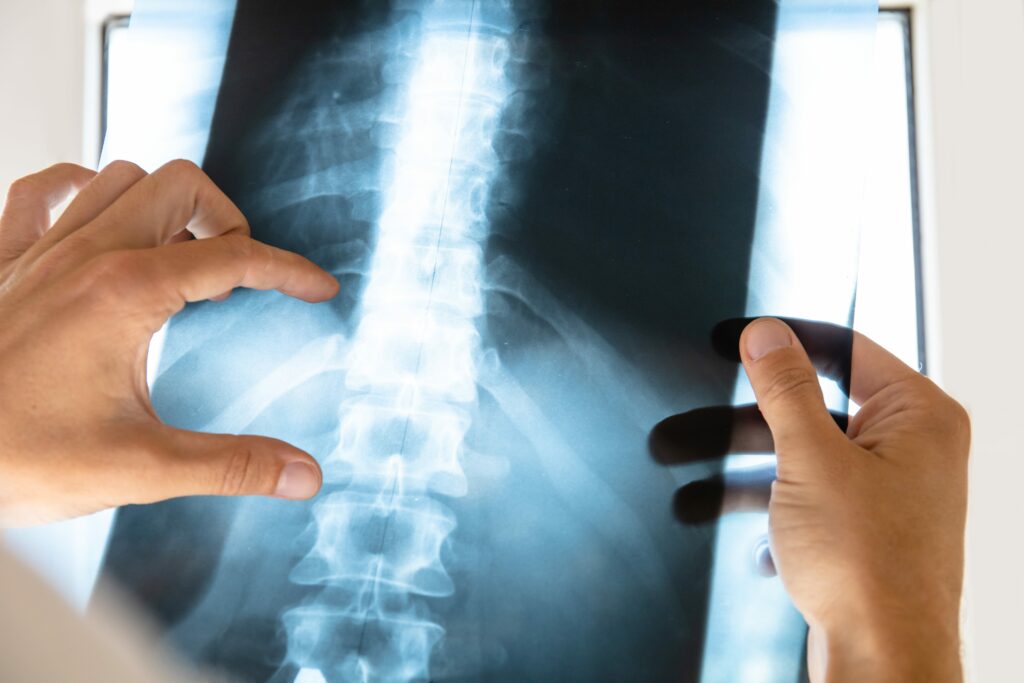This recent case, in which we recovered £350,000 for our client, shows that it is not always easy for a claimant to prove that a breach of duty led to an adverse outcome.
The claimant was taken by ambulance to the A&E department at her local hospital in excruciating pain having sustained a very heavy blow to her lower back in an accident. X-rays were taken and she was told that she was just “battered and bruised”. She was given a morphine injection and sent home, despite the fact that she could scarcely walk.
Two weeks later, x-rays were reviewed and the radiologist commented “I am suspicious that there has been a mild crush factor of the body of L1”. However, no further action was taken.
The claimant was referred back to hospital eight weeks after her original visit. Further x-rays were taken which revealed a significant spinal fracture at L1 and she was put in a full body cast. The claimant suffered chronic pain and it was later agreed by experts for both parties that she was disabled within the definition of the Disability Discrimination Act 1995.
Following an internal investigation, the senior orthopaedic consultant (who had not been involved in the claimant’s earlier care) stated that he thought that the delay in diagnosis and treatment had made no difference to the claimant’s outcome.
In reply to a letter of claim the defendant admitted breach of duty, but asserted that the delay in diagnosis and treatment of the claimant’s fracture had made no difference to her outcome, apart from increased suffering during that eight week period. Court proceedings were therefore issued.
During the course of court proceedings the defendant made three offers of £5,000, £15,000 and £50,000, all of which were rejected.
Matters were complicated by the fact that the claimant had an extremely complex underlying psychiatric history and for nearly a year it was suspected that she was suffering from ME. This diagnosis could not be confirmed due to a lengthy delay on the NHS waiting list to see a neurologist. It was eventually ascertained that she did not have ME and her extreme fatigue was probably a symptom of her depression.
Each party presented reports from experts in spinal surgery, psychiatry and care.
The defendant’s spinal surgeon maintained his position that the eight week delay in treatment had made no difference. However, the two spinal surgeons subsequently produced a joint report in which they agreed that the medical literature indicated that 60% of patients who were treated with immobilisation of the spine went on to make a pain free recovery and an even smaller minority were left with chronic pain. Despite this, the defendant’s expert was insistent that the delay in immobilisation had not contributed to the claimant’s poor outcome. He produced literature in support of his contention that conservative treatment (i.e. non-surgical) was likely to be just as effective.
The defendant’s expert insisted that he had very extensive experience of kyphosis (hunchback) correction surgery and most of his patients enjoyed a good outcome. However, the medical literature indicated that the likely aggravation of the claimant’s hunch caused by the delay in immobilisation would not normally be associated with an outcome of chronic pain. There was therefore a risk that at trial the court would find that the claimant’s psychiatric history meant she would probably have fallen into the very large minority of patients who did not enjoy a good outcome.
A settlement meeting took place five weeks before trial and terms were agreed that the claimant would receive £350,000 together with payment of her costs.
This case shows that it is not enough for a claimant to prove only a breach of duty followed by an adverse outcome. It may also be necessary to prove that the adverse outcome was a direct result of the breach of duty. The medical error was admitted at an early stage but the defendant continued on the strength of its argument on causation virtually to trial.
Read more about our experience in accident & emergency and orthopaedic & spinal injury cases.
Graham Bell specialises in cases involving A&E and spinal injury. If you would like to ask Graham a question about a potential case or you have a general query about medical negligence contact Graham on 01892 701358 in confidence.












